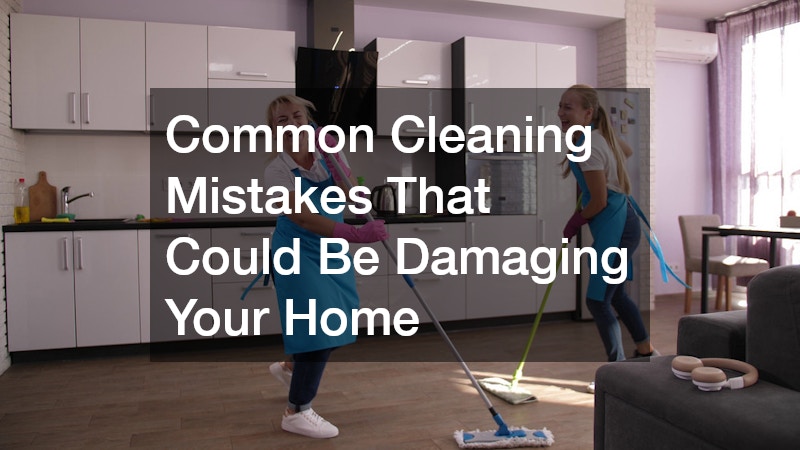
A clean home is a happy home—but what if some of your cleaning habits are actually causing harm? Many homeowners unknowingly damage their living spaces through well-intentioned but misguided cleaning practices. Understanding the potential pitfalls of common cleaning errors can save your home from unnecessary wear, discoloration, and long-term deterioration. This article explores some of the most frequent cleaning blunders and offers practical guidance to help you protect and maintain the beauty and longevity of your home.
Are You Using the Wrong Cleaning Products?
1. The Impact of Incorrect Chemical Use
One of the most common cleaning mistakes homeowners make is assuming that all cleaning products are interchangeable. Harsh chemicals or multipurpose cleaners might seem convenient, but they can wreak havoc on certain surfaces.
For instance, using bleach-based products on natural stone like granite or marble can cause etching, dullness, and irreversible discoloration. Similarly, ammonia-based glass cleaners can damage window tints or protective coatings. Even vinegar, often praised as an all-natural solution, can corrode grout, harm hardwood finishes, and degrade rubber seals in appliances.
The wrong cleaner doesn’t just affect appearance—it can shorten the lifespan of your surfaces and furnishings. Over time, repeated exposure to unsuitable chemicals leads to fading, cracking, or weakening of materials, forcing costly repairs or replacements.
2. How to Choose the Right Products for Different Surfaces
Choosing the correct cleaner starts with understanding the material you’re working with. For wood furniture and floors, opt for pH-neutral, wood-safe products that nourish rather than strip away finishes. Granite and marble should be cleaned with specially formulated stone cleaners that maintain their protective sealant. Stainless steel surfaces require non-abrasive cleaners that won’t scratch or leave streaks, while glass and mirrors benefit from ammonia-free options for a streak-free shine.
When in doubt, always test a new product on a small, inconspicuous area before applying it widely. Reading manufacturer recommendations for both surfaces and cleaning solutions is the best way to avoid permanent damage.
Is Over-Cleaning Harmful?
1. The Dangers of Frequent Cleaning
While cleanliness is essential, overdoing it can have unintended consequences. Excessive scrubbing, washing, or polishing can wear down finishes, strip protective coatings, and even damage fabrics or upholstery. For example, constantly wiping down wooden furniture with polish can create buildup, making surfaces sticky or dull. Over-cleaning stainless steel may lead to micro-scratches that attract fingerprints and tarnish faster.
Appliances also suffer from over-cleaning. Constantly running self-cleaning cycles in ovens, for instance, can shorten their lifespan due to extreme heat exposure. Likewise, washing machine components can corrode if cleaned too frequently with harsh solutions.
2. Finding the Balance: How Much is Optimal?
The key to effective cleaning is finding a sustainable rhythm that maintains cleanliness without overburdening your home’s materials. High-traffic areas like kitchens and bathrooms require more frequent attention, but surfaces like furniture, curtains, and windows benefit from less frequent, gentle cleaning.
Creating a weekly, monthly, and seasonal cleaning schedule can help strike the right balance. For example, vacuuming carpets once or twice a week is sufficient for most households, while deep cleaning upholstery every six months prevents buildup without causing premature wear.
3. Signs Your Home is Suffering from Over-Cleaning
If you notice cloudy finishes on wood, streaky stainless steel, faded fabrics, or weakened grout lines, your cleaning routine may be too aggressive. Appliances that appear dull or lose efficiency could also be reacting to overuse of harsh cleaners. When these signs appear, scaling back frequency and switching to gentler products can help your home recover its natural luster.
Could Poor Techniques Be Ruining Your Surfaces?
1. The Consequences of Scrubbing Incorrectly
The way you clean matters just as much as what you use. Many homeowners scrub vigorously to remove tough stains, but this can scratch delicate surfaces like glass, chrome, or ceramic. Using the wrong cleaning tools—like abrasive pads on soft materials—can cause irreparable marks or wear down protective coatings. Even wiping in circular motions can sometimes spread dirt and cause micro-scratches.
2. Correcting Common Technique Mistakes
Gentle, consistent motions are generally best. When dealing with stubborn grime, let cleaning agents sit for a few minutes before wiping to allow them to break down the dirt—this minimizes the need for forceful scrubbing. Use microfiber cloths instead of paper towels or rough sponges; microfiber is soft, absorbent, and effective at capturing dust without leaving scratches. Always clean from top to bottom to prevent re-soiling areas you’ve already cleaned.
3. The Role of Proper Tool Maintenance
Even the best tools can cause damage if not properly maintained. Dirty mops and cloths spread grime rather than remove it, while worn-out brushes can scratch rather than scrub. Regularly washing and replacing your cleaning tools ensures they perform as intended. Microfiber cloths should be laundered without fabric softener, as it reduces their effectiveness. Similarly, vacuum filters and attachments should be cleaned regularly to maintain suction power and prevent dust redistribution.
Cleaning your home should enhance its comfort and appearance—not degrade it. By recognizing and amending common cleaning mistakes, you can protect your home from unnecessary damage and preserve the integrity of its surfaces and appliances. Choosing the right products, avoiding over-cleaning, and refining your cleaning techniques all contribute to a safer, longer-lasting, and more beautiful living environment.
A little extra care and knowledge go a long way. With mindful cleaning habits, your home will not only look spotless but will remain in excellent condition for years to come, but for the best care always choose a professional cleaning company.





